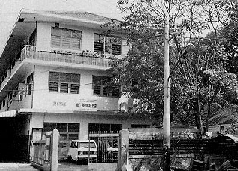Yuli Tri Suwarni, The Jakarta Post, Bandung
The suppression of religious freedom in this predominantly Muslim nation continues in West Java, where dozens of churches and places of worship have been forcibly closed by Muslim extremists over the past year.
A mob of around 50 people attempted Saturday to demolish a house they claimed was being used illegally by Christians as a place of worship in the hamlet of Cibintinu, Arjasari village, some 20 kilometers south of Bandung.
But police foiled the attempted closure of the church, telling the mob that neither individuals nor organizations were authorized to shut any house of worship.
The incident took place a day before Muslims across the country started the fasting month of Ramadhan.
The abortive attempt received the backing of Muslim hard-liners grouped under the Anti-Apostasy Division (DAP) of the Islamic Ulema Forum (FUUI) led by Suryana Nur Fatwama.
The move began at around 9 a.m. after a meeting at a nearby mosque. The mob then marched to Yayasan Penginjilan Roti Kehidupan church, where they talked to church administrator Ibu Eri.
As she refused to close the church, the crowd tried to start destroying the roof of the building. Around 10 policemen then arrived at the scene and told the mob to leave.
"We ask all of you to be patient. Anybody who tries to touch this building will be arrested," said Bandung Police chief Adj. Sr. Comr. Suparman who arrived later.
He said no group was allowed under the law to close down or demolish a house of worship except the local authorities.
The mob later dispersed but insisted that they would return to the scene if the church continued its activities.
According to Faidin, a local neighborhood official in charge of spiritual affairs, the church started activities two weeks ago, around one year after being "closed" by local residents.
"It has a congregation of only seven members, including two residents from the local village. The two had just converted to Christianity," Faidin said.
"We are disturbed by their presence and worried if they spread their teachings among local residents who are nearly 100 percent Muslim," he added.
No local Christian leaders were available to respond.
Under the revised joint decree issued earlier this year by Religious Affairs Minister Maftuh Basyuni and Home Minister M. Ma'ruf, the establishment of a house of worship must gain the approval of at least 60 local residents and have a minimum of 90 followers.
Churches in several cities across West Java have been under threat due to the actions of Islamic extremists including the Islam Defenders Front (FPI) and the Alliance of Anti-Apostasy Movement.
The number of churches forcibly closed in West Java alone since September 2004 is reported to be 30. Dozens of other churches were also forced to close in other provinces.
The UK-based human rights watchdog Christian Solidarity Worldwide (CSW) has warned of the increasing trend in church closures in West Java, raising international concern.
Saturday, September 23, 2006
Thursday, September 21, 2006
Indonesia Executes Three Christians
 JAKARTA, Friday, Sept. 22 — The European Union tried to get Indonesia to declare a moratorium on the death penalty, European diplomats and Indonesian officials said, as firing-squad executions loomed for three Christians convicted in connection with anti-Muslim communal violence in 2000 and for three Muslims convicted for their roles in the 2002 Bali bombings.
JAKARTA, Friday, Sept. 22 — The European Union tried to get Indonesia to declare a moratorium on the death penalty, European diplomats and Indonesian officials said, as firing-squad executions loomed for three Christians convicted in connection with anti-Muslim communal violence in 2000 and for three Muslims convicted for their roles in the 2002 Bali bombings.But the government went ahead on schedule, putting the three Christians to death in Palu, on the island of Sulawesi, shortly after midnight on Friday, the lawyer for the three men told Agence France-Presse. Other news agencies also reported the executions, citing government officials they did not name.
“The European Union, along with many other like-minded countries, opposes the use of the death penalty in all circumstances,” the Finnish Ambassador, Markko Niinioga, wrote in a letter that was delivered Wednesday to Indonesian president, Susilo Bambang Yudhoyono. “The E.U. finds this punishment cruel and inhuman,” he wrote.
Ambassador Niinioka was writing on behalf of the European Union because Finland now holds the union’s rotating presidency. His letter was read to The New York Times on Thursday by a European diplomat, who did so on the condition of anonymity because the letter had not been released publicly. An aide to President Yudhoyono confirmed that it had been received.
Mr. Yudhoyono is considered a leading contender for the Nobel Peace Prize, because of his work in bringing about an end to the separatist war in Aceh, the country’s westernmost province. European diplomats said on Thursday that the executions could hurt his chances, given the strong anti-death-penalty sentiments among European governments.
A senior Indonesian government official, who was granted anonymity in order to learn the government’s response, said on Thursday that despite the letter, there was almost no chance of stopping the execution of the Christians. “We’re going to execute the Bali bombers soon after,” he added, by way of explanation.
In this overwhelmingly Muslim country, the government considers that the risk of political protests would be too great if it executed the Bali bombers and not the Christians.
The trial and conviction of the three Christians — two mechanics and a farmer —was in some manner a culmination of the Muslim-Christian violence that consumed Poso, a town in the province of Central Sulawesi, for eight years.
The condemned men were Fabianus Tibo, 60, Marinus Riwu, 48, and Dominggus da Silva, 42. When they were tried in 2001, no witnesses testified about seeing any of the men actually kill anyone, according to Dave McRae, a specialist in the Poso conflict at the Australian National University who wrote about the case in The Jakarta Post on Wednesday.
Mr. McRae, who attended the trial, wrote that the evidence against Mr. Riwu “was very weak,” with the only testimony against him saying that he had instructed other Christians in the use of arrows.
Even so, the three-judge court found that Mr. Tibo was the leader of a Christian militia called the “Red Group,” and that Mr. da Silva was one of his lieutenants.
More than 150 men have been tried in connection with the Poso violence, but only a handful of them were Muslims, the Associated Press reported. None of the other defendants received a sentence more severe than 15 years in prison, according to Mr. McRae.
The executions of the three men were originally scheduled for early August, but they were postponed at the last minute following an appeal by Pope Benedict XVI. After that, the scheduled executions of the Bali bombers was also postponed; with the Muslim holy month of Ramadan beginning on Sunday, it will probably be late October before a new date is set for them.
Monday, September 11, 2006
Student could face six years for insulting President
The Jakarta Post, Jakarta
The prosecution asked the West Jakarta District Court on Monday to sentence a student to six years in prison for insulting President Susilo Bambang Yudhoyono and Vice President Jusuf Kalla during a protest in June.
Prosecutor Agung Ardyanto said Fahrur "Paunk" Rohman, 20, a student at Syarif Hidayatullah State Islamic University, insulted the head of state in a speech during a protest organized by the Alliance of People's Movements and the Try Soeharto Movement. The protest took place on the campus of National University in West Jakarta.
"The defendant violated the Criminal Code by insulting the head of state," he told the court.
Agung also accused Paunk of distributing insulting posters and flyers during the protest.
The prosecutor said the posters depicted the President and Vice President, with the words "No Trust", "Down" and "We can't take it anymore".
He said the flyers contained the words, "SBY-JK have failed and betrayed reform. Down with SBY-JK right now."
Paunk is being tried under an article in the Criminal Code that was enacted during the Dutch colonial era to protect colonial rulers from defamation. Legal scholars and human rights activists have for years advocated for the article to be scrapped, arguing it infringes on people's freedom of expression.
Meanwhile, two students were detained by the Jakarta Police on Monday after throwing rotten eggs at Deputy Attorney General for Special Crimes Hendarman Supandji at the House of Representatives.
Jayabaya University student Fariz, 22, a member of the Anti-Manipulation at State Enterprises Student Movement (Geram BUMN), allegedly threw three rotten eggs at Hendarman during a recess in a meeting between the Attorney General's Office and House Commission III for legal affairs.
According to the student group's coordinator, Akbar Kiahaly, about seven security guards tackled Fariz and another Geram BUMN member, Dipa, who is a student at the Institute of Social and Political Sciences.
"They beat up Fariz and Dipa and kicked them in the face," he alleged.
Akbar said the group threw rotten eggs at Hendarman in protest over the failure of the Attorney General's Office to prosecute graft suspects.
"There were 20 of us who made it into the House and we brought three kilograms of rotten eggs."
The prosecution asked the West Jakarta District Court on Monday to sentence a student to six years in prison for insulting President Susilo Bambang Yudhoyono and Vice President Jusuf Kalla during a protest in June.
Prosecutor Agung Ardyanto said Fahrur "Paunk" Rohman, 20, a student at Syarif Hidayatullah State Islamic University, insulted the head of state in a speech during a protest organized by the Alliance of People's Movements and the Try Soeharto Movement. The protest took place on the campus of National University in West Jakarta.
"The defendant violated the Criminal Code by insulting the head of state," he told the court.
Agung also accused Paunk of distributing insulting posters and flyers during the protest.
The prosecutor said the posters depicted the President and Vice President, with the words "No Trust", "Down" and "We can't take it anymore".
He said the flyers contained the words, "SBY-JK have failed and betrayed reform. Down with SBY-JK right now."
Paunk is being tried under an article in the Criminal Code that was enacted during the Dutch colonial era to protect colonial rulers from defamation. Legal scholars and human rights activists have for years advocated for the article to be scrapped, arguing it infringes on people's freedom of expression.
Meanwhile, two students were detained by the Jakarta Police on Monday after throwing rotten eggs at Deputy Attorney General for Special Crimes Hendarman Supandji at the House of Representatives.
Jayabaya University student Fariz, 22, a member of the Anti-Manipulation at State Enterprises Student Movement (Geram BUMN), allegedly threw three rotten eggs at Hendarman during a recess in a meeting between the Attorney General's Office and House Commission III for legal affairs.
According to the student group's coordinator, Akbar Kiahaly, about seven security guards tackled Fariz and another Geram BUMN member, Dipa, who is a student at the Institute of Social and Political Sciences.
"They beat up Fariz and Dipa and kicked them in the face," he alleged.
Akbar said the group threw rotten eggs at Hendarman in protest over the failure of the Attorney General's Office to prosecute graft suspects.
"There were 20 of us who made it into the House and we brought three kilograms of rotten eggs."
Subscribe to:
Posts (Atom)

